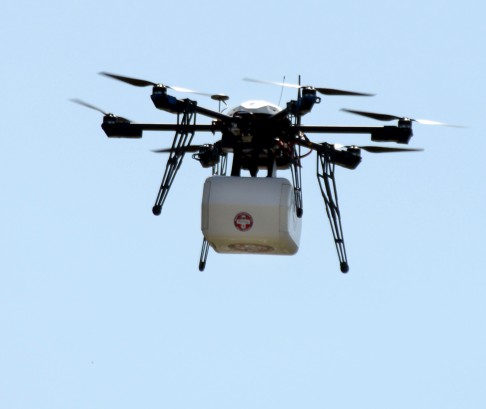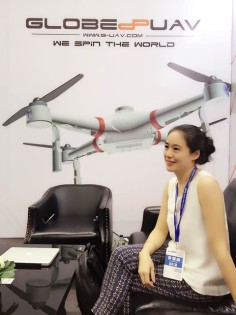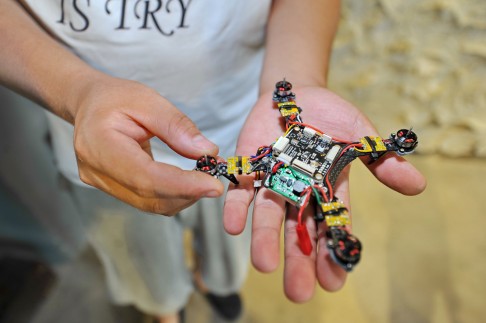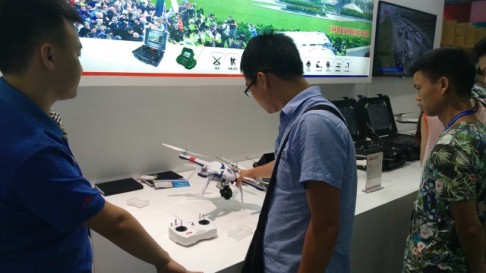With plenty of venture capital, know-how and a stable market, the city is the perfect base for fast-growing tech firms looking to raise funds
HE HUIFENG HUIFENG.HE@SCMP.COM
PUBLISHED : Friday, 31 July, 2015, 7:16am
UPDATED : Saturday, 01 August, 2015, 2:18am
A Phantom 3 from DJI, the Shenzhen-based company that controls 70 per cent of the global market for civilian drones. Photo AP
As China's exports of drones for civilian use surges and competition in the industry sharpens, more pundits are pointing to Hong Kong as an ideal destination for start-ups in this niche industry to attract funding.
Most of the world’s drones are made in the city of Shenzhen just across the Chinese border, but Hong Kong offers plenty of idea-hungry venture capital, a platoon of tech-oriented incubators, and the nerve-calming effect of being a stable market in which to list.
“A stable capital market, especially stock market, is very important for fast- growing tech companies that are looking to fundraise,” said Zhang Jie, the CEO of Shenzhen-based G-UAV Intelligent Technologies.
 A drone delivers prescription medication in Vancouver on July 17. As their commercial and civilian use increases, drones can be applied in various field from agriculture to surveillance. Photo: AP
A drone delivers prescription medication in Vancouver on July 17. As their commercial and civilian use increases, drones can be applied in various field from agriculture to surveillance. Photo: AP
“Most drone makers in Shenzhen had a good performance this year,” she told the South China Morning Post, adding that she set up a company in Hong Kong earlier this month and plans to have it listed by as early as 2017.
The southern Chinese city of Shenzhen accounted for 99.9 per cent of China’s drone exports in the first half of the year, according to China Business News.
It is considered an ideal manufacturing base due to its comprehensive supply chains, clusters of designers, wealth of innovators and makers, and cheap labour costs, even though these are rising quickly.
 Zhang Jie, the CEO of Shenzhen-based G-UAV Intelligent Technologies, appears in the company's promotional poster. Photo: SCMP Pictures
Zhang Jie, the CEO of Shenzhen-based G-UAV Intelligent Technologies, appears in the company's promotional poster. Photo: SCMP Pictures
Most of the world’s commercial drones are made in this industrial base in Guangdong province, and 95 per cent of those produced in Shenzhen come from local drone maker DJI Technology.
Manufacturers in the city sent 160,000 such drones overseas from January to May, worth a total of 750 million yuan (US$120.81 million). This marks a 69-fold increase in volume from the year-earlier period, media reports show.
But no rival company comes close to DJI in terms of productivity and sales: it already controls 70 per cent of the global market for civilian drones.
 Young entrepreneurs in northeast China's Jilin province showed off an automatic-tracking drone this week. The two Jilin University graduates, Gao Hua and Hou Xiaoye, founded their 'geek studio' to facilitate innovation in areas like 3D printers, drones and wearable virtual reality headsets, they said. Photo: Xinhua
Young entrepreneurs in northeast China's Jilin province showed off an automatic-tracking drone this week. The two Jilin University graduates, Gao Hua and Hou Xiaoye, founded their 'geek studio' to facilitate innovation in areas like 3D printers, drones and wearable virtual reality headsets, they said. Photo: Xinhua
With some pundits valuing DJI at US$10 billion, it ranks as one of the world’s most valuable start-ups.
How long it will enjoy this enviable monopoly status is anyone’s guess, but the wolves knocking on the door seem confident it won’t last long.
“Companies of our calibre that compete with DJI will be able to compete fiercely for more market share next year,” said Zhang, adding that she expects her company’s drone exports to more than double to 65 million yuan this year. Almost all of them are bound for foreign shores.
 Amid burgeoning demand, Chinese shoppers look at the drones available at a local trade fair. Photo: SCMP Pictures
Amid burgeoning demand, Chinese shoppers look at the drones available at a local trade fair. Photo: SCMP Pictures
Several hundred firms are eyeing the market for small commercial drones and 80 per cent are based in Shenzhen, she said.
G-UAV has launched a drone for agricultural use that it claims is the first of its kind to hit the market in China. The company said 500 municipal governments in the country have already purchased at least one of them.
A wearable device that can remotely control such drones is due to be released by the company soon, Zhang said, describing it as another landmark achievement. Patents have been applied for in China, Europe and the US, she added.
Some experts predict DJI will struggle to maintain its technological edge as its rivals play catch-up.
“Many companies offer similar functions to DJI’s Phantom 3,” said Zhang. “Some have added features. For example, ours come in different sizes.”
Art-Tech, another Shenzhen-based drone maker, launched its iEagle in November. The company claims the drone's battery can match that of the Phantom 3 while offering a better hovering and rotating capability.
The company plans to launch two follow-up products soon to claim some of DJI’s market share, it said.
http://m.scmp.com/tech/start-ups/article/1845257/made-shenzhen-funded-hong-kong-chinese-drone-start-ups-told-look